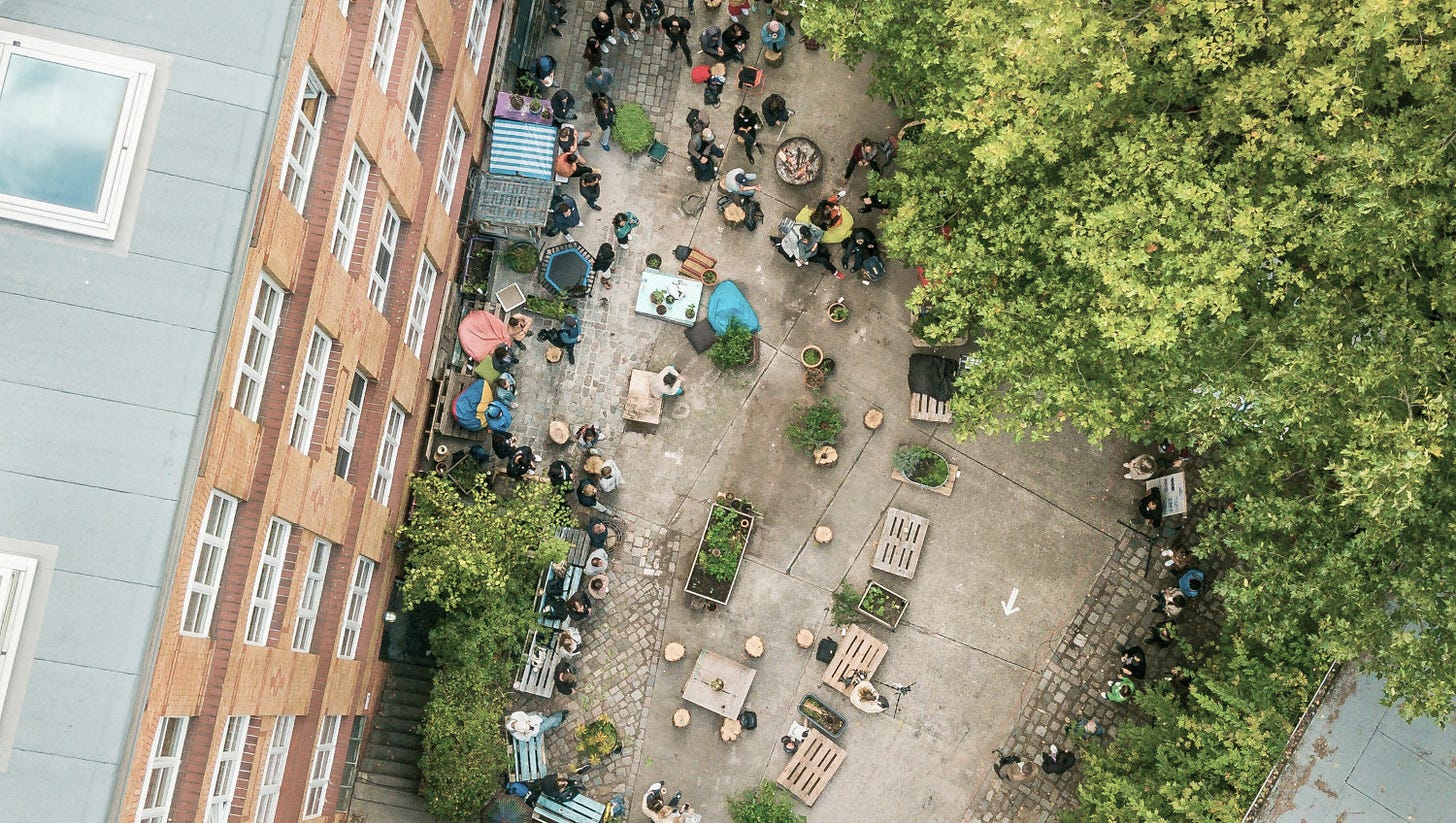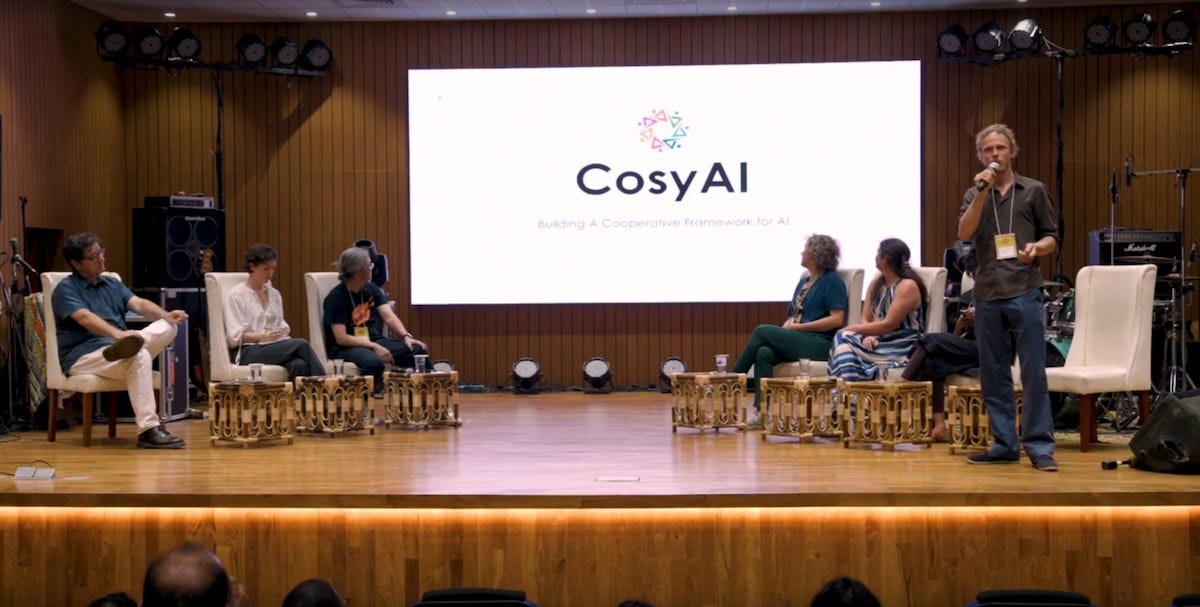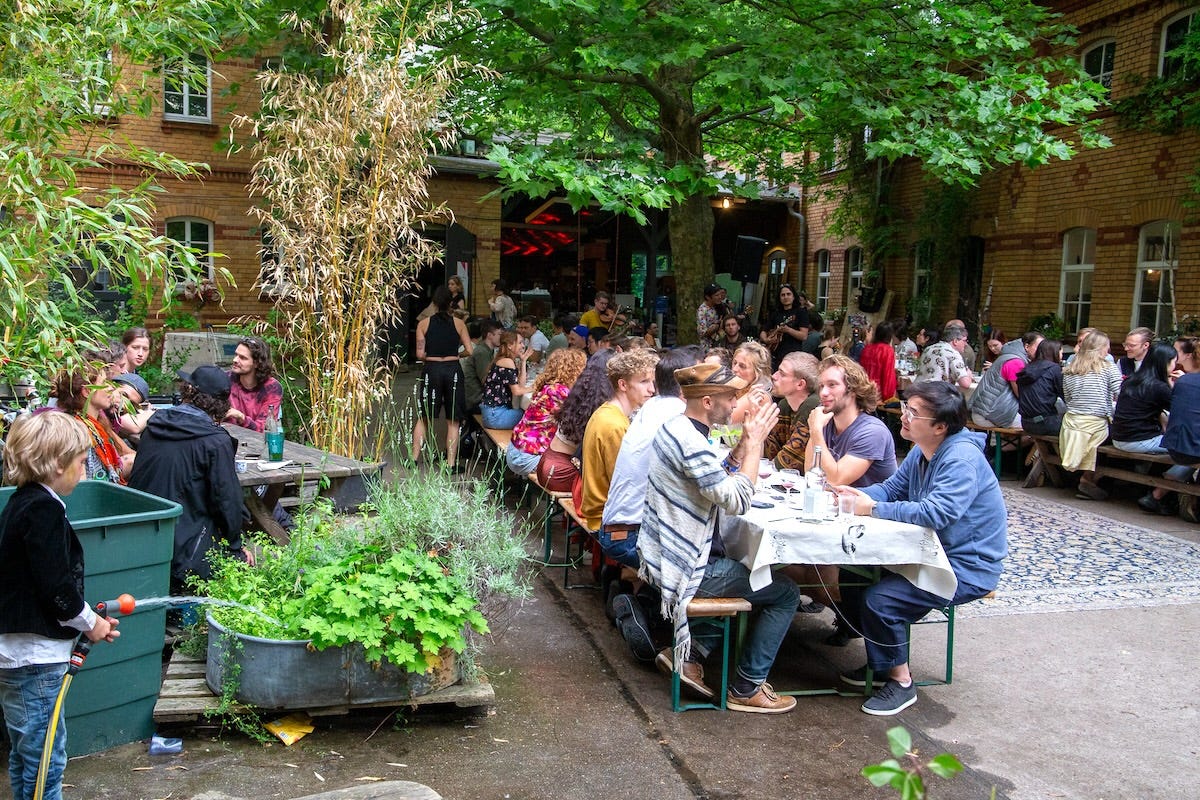To Ground or Not to Ground
What a near-crash and an imploded community experiment taught me about staying sane in uncertain times
Last year, I spent eight months with an ambitious community building project in Berlin. We wanted to continue and expand the international community hub at the Moos, a beautiful old factory complex with a green courtyard that feels like a peaceful village square under a big plane tree.
In the end, it all imploded. And it taught me one core lesson that I believe is of major importance as we face increasing global uncertainty:
For any project that seeks to make a positive difference in the world, no matter how big or small, there cannot be too much emphasis on taking care of the team’s grounding.
A definition of grounding
By grounding I understand an inner stability that allows us to stay calm and true to our deeper values, even in the midst of external instability. A fitting metaphor is a tree with deep roots in solid ground. In contrast, a lack of grounding feels like a tree standing on shallow roots in soft sand.
Grounding looks different for different people. In different phases of life, it may require different practices or points of focus. But they all share something in common: the moment we start, we feel more peaceful and calm.
Grounding practices can involve:
Connecting with nature, for example through walks, retreats, or outdoor sports
Connecting with our body, for example through yoga, dancing, singing, or breathwork
Connecting with our deeper consciousness, for example through meditation, music, guided rituals
Connecting with other people, for example through community gatherings, authentic relating workshops, or intentional retreats
Connecting with our spiritual path, whatever that may mean for us
Of course, this list is by no means comprehensive. In my experience, the most important thing is to maintain a daily grounding routine that works for you.
But now, let's jump into the story of how I (re-)learned this the hard way:
The initial reset
It all started with an accident. On Christmas Eve of 2023, around 4 a.m., I was driving from Frankfurt to Hamburg to meet my family. Just a few hours earlier, I had landed from India, where I had spoken at the Roots of Resilience conference and spent a month traveling, writing, and reflecting in the southern Indian states of Goa and Kerala.
In retrospect, the name of this conference could have been the title of the chapter that followed, although my contribution had been about CosyAI, our project to enable cooperative ownership of AI.
Now, on that dark, rainy December night, I was driving on the empty highway in a van a friend had lent me. Roadsigns came up that said the highway was splitting in two. I looked at my phone to check the route. But it had lost connection, so I zoomed in manually. I looked up at the signs to confirm that I needed to move into the right lanes. When I looked back at the road, the massive concrete block marking the highway split appeared out of the dark right in front of me.
In that moment, I was certain I was too close and too fast to avoid crashing straight into it. But somehow, against all odds, I managed to pull back and only scraped the block with the side of the van.
About 30 minutes after the accident, I noticed my body was shaking. I had kept driving, focused on figuring out the right route after missing the junction. I took the next exit and pulled over. First, I checked the van. It had taken serious scratches and dents all along the right side, and the front light was broken. But it seemed still drivable. I knew my friend would forgive me, and that the car could be fixed. But I also knew I had been too careless with the trust my friend had placed in me.
Then I felt into myself. The short moment of thinking that this was the end did have an impact on me. Something in me had become very serious. It wasn't that it had given me a new insight. Rather, it sharply reinforced something that had already been clear.
It's our most basic responsibility to take care of ourselves. Not just for our own sake, but for those who love us and rely on us.
If I had reacted a split second later, it would have been a horrific Christmas for my parents, my sister, and my little niece.
Back to Berlin
The impact of the accident was still resonating within me when I rented a room at the Moos in mid-January of 2024. My determination was to make the best use of the clarity that 'game over' moment had given me. One important way in which I wanted to take better care of myself was to dedicate time and effort into being part of a community. But this clarity would soon be tested in an unexpected way.
The Moos had long been my favorite community space in Berlin. I’d been there for countless concerts, exhibitions, tea ceremonies, and community dinners with hundreds of people. What I always had liked the most was the fascinating mix of people from all over the world.
When I heard that the future of the community events at the Moos was at risk, it made me think. Maybe this was the time and place to give Cosyland a home base, a non-profit that we had registered last year. Jacob, who had been the main community organizer at the the Moos for years, was one of Cosyland's founding members. He liked the idea. And so did Silva, an active community member who had been contemplating to start her own community building project.
The birth of The Y
As things tend to go at the Moos, just a few days later, new inspiring people appeared with new inspiring ideas. Bradley, Arvy, and Iva joined the conversation, bringing in the concept of time shares as a way to build a sustainable business model for the event and residency spaces.
Soon, we formed a small team around the idea of taking over the community spaces at the Moos and turning it into a hub that helped communities and people to connect and thrive. Our goal was to complement it with a "community tech lab" that would enable us to provide communities with tools for collaboration and common storytelling and create a stable income stream beyond renting out the rooms and event spaces.
To reflect our vision of connecting many dots, we named the project The Y Berlin. Cosyland would serve as the non-profit wing to offer low cost events and educational activities, while we used a limited company to actually rent the around 950 square meters of residency and event space in March 2024.
The grounding question
A few weeks into our project, Silva and I took a walk along the Spree River. "We need to take better care of our grounding," she said. In retrospect, this was the most accurate diagnosis of our project’s dynamic, more on point than anything I heard in dozens of revision sessions and feedback rounds. It basically summarized the core lesson I took from the entire eight months:
For any project, no matter how big or small, there cannot be too much emphasis on taking care of the team’s grounding.
This may sound trivial, but most projects face delicate trade-offs around this crucial factor on an almost daily basis. I’ve seen the same pattern repeated everywhere: The team's grounding erodes, sometimes slowly, sometimes quickly, and then either the project fails, or it loses its original intention. If it continues, it often turns into a self-serving operation, mostly focused on compensating the team for doing work they’re no longer fully aligned with.
Collective ADHD
What I observed at The Y Berlin was that, although each of us brought extensive experience in regenerative practices, we were quickly overstretched by the daily management of the residencies and all kinds of events, workshops, exhibitions, and community gatherings that we hosted.
Since most of us in the core team lived on site, we constantly jumped between roles, from host, to participant, to fellow resident in need of calm and rest. At the same time, we were struggling to get the project financially viable. Week after week, we postponed our “time-share campaign,” which was meant to raise enough funds to pay ourselves a salary and give us the runway to develop our broader vision of the community tech lab.
On top of that came the deeper tensions and contradictions within the Moos itself. It had its own history as a village-like collection of co-living spaces and small offices run by progressive companies and non-profits. From day one, we were navigating relationships with neighbors whose nerves had already been tested by years of noisy events.
These rather draining experiences were constantly balanced by a steady stream of energizing moments, fascinating conversations, unexpected visits, a spontaneous community brunch or dinner, someone proposing an amazing event for the next day, or a traveling friend urgently needing a place to stay.
Ironically, the whole purpose of our project was to create a space where people and communities could connect and thrive. And yet, we ourselves became less and less grounded. This happened despite the fact that many of the events we hosted were focused on grounding practices. And despite the many self-development professionals who visited and were more than willing to support us.
Looking back, it’s hard for me to understand how I could keep participating in this collective ADHD. Month after month, we failed to meet our basic goal of paying ourselves. And I saw almost no real progress toward my deeper intention of building a home for Cosyland.
Still, I can see some valid points that kept us going:
- A sense of responsibility to deliver on the commitments we had made.
- A steady stream of new possibilities and new chances to make our activities viable and reach our goal to build a thriving community hub.
- And after all, despite all the madness, those months were also deeply rewarding, with an abundance of inspiring conversations and beautiful moments.
Yet, no matter how valid these points might be, we clearly should have stopped or completely pivoted earlier. This is a pattern I’ve seen again and again in well-intended projects and communities:
The Grounding spiral
By juggling too many responsibilities, we took less time to care for ourselves. And as we became less grounded, we also became less aware of our own state. Instead of taking the time to return to balance, we jumped into distractions and avoidance and took on more responsibilities. Whatever we did from that ungrounded state only led to more distractions, more avoidance, and less grounding.
But this grounding spiral can move upward, too. A steady daily grounding practice can increase our awareness, build our capacity to tend to early signs of imbalance, and strengthen our resilience to outside distractions.
Learning from our struggle at the Moos
In the end, our community project at the Moos imploded. I won't go into details here, as it involved complex interpersonal dynamics that deserve privacy and respect. What I can say with regard to my own role is that I kept pushing until I no longer had the energy to contribute to a good closing and had to pull out completely.
Despite everything, there's a part of me that is still really proud of our defiant commitment to push on to save the Moos as a community venue. I'm also deeply grateful for the support from many community members who joined our efforts at various times. And there are the new connections that I could form during this time and that I wouldn't want to miss.
After all, this experience provided a hands-on test of my theories about organizational structures and collaborative practices. In a way, it brought the lesson from that Christmas Eve accident into the level of organizations:
Our first and most important responsibility is to take care of ourselves, so that we’re able to support and care for others.
Grounding Organizations
It's good to have clarity now that this will also be a fundamental principle of any organization I will build or join in the future. Especially in times that are marked by increasing external uncertainty, it's crucial that transformative organizations dedicate sufficient resources and focus time to establishing and protecting grounding practices for the team.
Over the past months, I have been working on a "Cooperative 3.0" model which embraces this principle and combines it with the classic cooperative principles and advanced methods for effective decentralized management. I will soon publish a dedicated article on this integrated model here.
Recovering stronger
Taking the time to regenerate and ground myself has brought me a new level of clarity. Interestingly, I feel much stronger and more sensitive at the same time, especially since my last Vipassana meditation retreat in April this year. I recommend these retreats to anyone interested in meditation, and my morning and evening meditation is for me the solid base of my daily grounding.
I feel that this clarity comes right on time, given the increasing pressures we face individually, socially, and globally. Most people I meet these days seem to struggle with a deep-seated unrest that affects their motivation and mood. I think it's important to listen to this inner unrest and take it as a chance to review our priorities.
What's next
From now on, I will write here regularly about the challenge to grow our inner strength in these times of external uncertainty. I will look at this in the specific context of increasingly powerful AI systems, which risk fundamentally disrupting our societies, but which also bring unprecedented potential for our work toward a more regenerative and equitable world. Sign up here, if this interests you.
On the practical side, I'm currently exploring how to turn CosyAI into a pioneer model of a "cooperative 3.0". CosyAI has the goal to enable cooperative ownership of AI, with the vision to create an “AI Safe Space” for everyone who wants to be protected from its potentially harmful effects. It will be a great test-ground for developing an organizational structure that ensures everyone involved can contribute from a well-grounded setting.
If this resonates with you, please don’t hesitate to reach out. I’d also be grateful if you share this with anyone to whom it might be relevant.
I wish you all the best for your own grounding journey. If you have daily practices that work for you, please feel invited to share them in the comments.
Three things you can do for grounding yourself right now
A ten minute walk (ideally every morning right after waking up)
Meditate (ideally right after the walk, even if it's only for 10-15 minutes)
Stand up and take three deep breaths (with closed eyes, breathe out slowly while feeling your feet on the ground)
Relevant links:
A text on why we really should prepare for increasing disruptions from AI










